SITE GUIDE
SEARCH
REVIEWS
REVIEW ARCHIVES
ADVERTISING AT CURTAINUP
FEATURES
NEWS
Etcetera and
Short Term Listings
LISTINGS
Broadway
Off-Broadway
NYC Restaurants
BOOKS and CDs
OTHER PLACES
Berkshires
London
California
New Jersey
DC
Philadelphia
Elsewhere
QUOTES
TKTS
PLAYWRIGHTS' ALBUMS
LETTERS TO EDITOR
FILM
LINKS
MISCELLANEOUS
Free Updates
Masthead
Writing for Us
A CurtainUp  London Review
London Review
 London Review
London ReviewDancing at Lughnasa
| You work hard at your job, you try to keep the home together but suddenly you realize that cracks are formin' everywhere. It's all about to collapse, Maggie.— Kate Mundy
|

Niamh Cusack as Maggie and Michelle Fairley as Kate (Photo: Manuel Harlan) |
The play takes place in 1936 when Michael is seven years old with the adult Michael recalling life with his mother and aunts. Friel's play is about the change in society as industrialisation comes to this part of Ireland with Catholicism and Paganism the religious influences on the people.
Friel's characterisation is so powerful that we have a clear picture of the strengths and weaknesses of each of the five sisters. The head of house and the only wage earner is schoolteacher Kate (Michelle Fairley) dour, responsible, dutiful and serious; the engine house of the family, Maggie (Niamh Cusack), is hard working, quirky, practical, cheerful and jokey; Chrissie, (Andrea Corr) the youngest daughter is beautiful, romantic, idealistic, vulnerable and depressive; Agnes (Susan Lynch) is short sighted, contemplative and plain in comparison with the lovely Chrissie; Rose (Simone Kirby) is naive and would today be described as having special needs. Agnes and Rose are homeworkers, employed hand knitting gloves but the family are reliant on Kate's wages and their chickens and crops for existence. Agnes blinks perpetually, her eyesight made worse by knitting with fine wool.
The two men are flawed, weak characters. There is their brother, Father Jack who has malaria and who returns from Africa with strange tales of rituals, more heathen than Catholic. Aas he relates killing roosters and face painting and dancing for days on end, we are never sure whether he has become mentally Africanised or whether he is deluded from malarial fever. His defence of the love child is more African than European. This parallels with the sisters talking about the Celtic Feast of Lughnasa in Ireland, an ancient Pagan harvest festival of crazy dancing round a bonfire dedicated to Lugh the ancient god of light.
Jo Stone Fewings is the gramophone salesman and Flash Harry, Welshman Gerry Evans and father of Chrissie's little boy. He looks like Errol Flynn, a charmer and womaniser, dances like Fred Astaire but has the morality of a skunk.
The valve radio is the sister's source of music and in the first act they dance with wild abandon. Maggie daubs her face with flour and the younger sisters hurl around to Scarlett Mackmin's vibrant choreography. Even straight laced Kate joins in with traditional Irish dancing of dazzling footwork with her arms straight by her side. As the radio symbolises a modern world that is about to descend on rural Ireland, so we hear that a factory will replace the home knitters but there is no place for Rose and Agnes. Rose and Agnes run away to a life of destitution in London after Rose meets a boy at Lughnasa known for its trial marriages and the family cannot cope with another scandal. Chrissie, we are told by Michael, will spend the rest of her life as a worker in that knitwear factory.
The set is the farmhouse kitchen but with a beautiful full sized sycamore tree set on the circular stage at the Old Vic for Gerry to climb as he tried to mend the radio aerial. The women wear dresses covered by flowered overalls and wear workman's boots. Only Gerry is allowed the fashion of the 1930s era with his straw hat, wide legged, turned up trousers, patterned knit sleeveless jumper and shiny brown shoes.
Anna Mackmin's production is powerful and evocative and the ensemble performances are mesmerising. Finbar Lynch, curiously shaggy with an unkempt beard and longer hair has one of the best voices on the English stage — I could listen to him forever. Niamh Cusack, with her father's eyes is perfectly cast as the enigmatic Maggie and Michelle Fairley is all repressed spinster worn down by responsibility.
If you miss this production you will have the irritation of others telling you how good it was and how fool you were to miss it for a decade.
| Dancing at Lughnasa
Written by Brian Friel Directed by Anna Mackmin Starring: Michelle Fairley, Finbar Lynch, Niamh Cusack, Andrea Corr With: Susan Lynch, Simone Kirby, Jo Stone-Fewings, Peter McDonald Design: Lez Brotherston Lighting: Paule Constable Sound: Gareth Fry Choreographer: Scarlett Mackmin Running time: Two hours 20 minutes with an interval Box Office: 0870 060 6628 Booking to 9th May 2009 Reviewed by Lizzie Loveridge based on 9th March 2009 performance at the Old Vic, Waterloo Road, London SE1 (Rail/Tube: Waterloo) |
|
REVIEW FEEDBACK Highlight one of the responses below and click "copy" or"CTRL+C"
Paste the highlighted text into the subject line (CTRL+ V): Feel free to add detailed comments in the body of the email . . . also the names and emails of any friends to whom you'd like us to forward a copy of this review. |
|
London Theatre Tickets Lion King Tickets Billy Elliot Tickets Mighty Boosh Tickets Mamma Mia Tickets We Will Rock You Tickets Theatre Tickets |




